Voters cast their ballots in the New Hampshire Primary at a voting site at Pinkerton Academy in Derry, N.H., on Jan. 23. File Photo by Amanda Sabga/UPI |
License PhotoSept. 6 (UPI) — Thousands of Nebraskans with felony convictions on their records are waiting for the state supreme court to make a decision on whether or not their voting rights will be restored ahead of the November election.
The state legislature in April passed LB 20, a bill that repealed Nebraska’s long standing two-year waiting period for the restoration of voting rights. The law would automatically restore the voting rights of more than 7,000 people and make the voting rights of convicted felons crystal clear for years to come.
However, on July 17, two days before the law was slated to take effect, Attorney General Michael Hilgers issued an opinion stating the authority to restore voting rights belongs to himself, Secretary of State Robert Evnen and Gov. Jim Pillen. The restoration of voting rights is also considered a pardon, falling under the authority of the Board of Pardons.
“Any person sentenced to be punished for any felony…shall be deemed incompetent to be an elector…unless said convict shall receive from the governor of this state a general pardon,” Hilgers wrote in his opinion.
“We have opined that ‘the legislature cannot legislate the restoration of civil rights. Neither can the legislature direct the Board of Pardons in exercising its duties by passing legislation that states that the Board shall restore civil rights to any person or group of people.'”
Dr. Tommy Moore is the Prison Program Associate for RISE, a nonprofit organization in Nebraska that supports re-entry. In this role, he educates prisoners to prepare them for life after their time is served. He also served a prison sentence of more than nine years in the Florida Department of Corrections.
Moore told UPI that having his voting rights restored in 2018 was empowering. He is registered to vote in Nebraska. However, he does not plan to vote unless he is explicitly told he can by his colleague, RISE director of public policy Jasmine Harris.
“I’m not going to vote because I’m fearful of violating the law,” he said. “I’m so scared that I can be prosecuted. It’s almost unfair that you’re threatening to prosecute me for something I legally obtained. It’s actually creating a trauma in my psychological well-being.”
Felons were banned from voting for life in Nebraska until the state passed LB 53 in 2005. This created the two-year waiting period after a person completed their sentence.
The matter is complicated by the fact that some convictions were handed down in other states. Nebraska’s officials would not be able to issue pardons in those cases.
The ACLU and Civic Nebraska are among the plaintiffs to file a lawsuit in the state supreme court, asking it to uphold LB 20 and restore voting rights.
Time is running out for the state supreme court to weigh in on the issue in time for the election. It publishes new opinions on Fridays. There are nine remaining before the election.
The timing of the challenge by the attorney general has led advocates for voting rights to believe it was a strategic move to not allow the court to reverse the decision before the election.
“For nearly 20 years, the state has delayed justice for thousands of Nebraskans by forcing an additional two-year waiting period to vote after the completion of a felony sentence,” Steve Smith, spokesman for Civic Nebraska, told UPI in a statement. “The Attorney General’s opinion and the Secretary of State’s announcement — made public less than 48 hours before a law to remedy this was to take effect — has introduced more uncertainty, delay, and complication.”
Gavin Geis, executive director of Common Cause Nebraska, told UPI that there is concern that the court’s decision could not only overturn the new law, it could roll back on the 2005 law as well. This could take away the voting rights of tens of thousands of people indefinitely.
“What we’ve been told is that the secretary of state said they’re going to acknowledge and allow people who registered under the two-year waiting period and allow them to continue to vote and accept those registrations,” Geis said. “If the court comes down against that old system then their registration would be thrown into chaos. It would challenge the new law but it would also challenge the old law. Then we’re back to lifetime bans.”
Years of case law have established that the legislature has the authority to restore voting rights, Geis said. The legislature did so with LB 53 and it stood unchallenged for 19 years.
Geis believes that political ideology has become more prevalent in state offices, leading to the sudden challenge to the legislature’s authority on civil rights issues.
“The change is in personnel. It’s in who holds these positions and how they view their roles,” he said. “The previous attorney general and secretary of state saw themselves as administrators carrying out their constitutional roles. Ideology has seeped into the attorney general’s and secretary of state’s offices. It’s become about upholding an ideological opinion.”
Nebraska’s former Secretary of State John A. Gale disagrees with the intervention by state officials who halted the new law, including his successor, Evnen.
“Secretary Evnen and I are old friends. I served as his predecessor as Secretary of State and Chief Election Officer for 18 years. We are both attorneys and attorneys often disagree,” Gale said in a statement. “In this case, I strongly believe the Nebraska Legislature acted with clear authority and LB53 and LB 20 should be enforced as the law for the 2024 election and future elections.”
Supporters of restoring voting rights were prepared to rally newly eligible voters to register and turn out on Nov. 5. Instead they have shifted their focus to education. Geis said his organization and other advocates are keeping people updated on the status of the supreme court case but warning them not to try to register. He worries attempting to register while ineligible may be used against them in the future.
Regardless of legality, barriers remain in getting convicted felons engaged in the election process. Some are highly motivated and passionate about going to the polls. Others feel detached from their civic duty and believe that they do not have a voice.
“There is genuine disenfranchisement that they feel the system doesn’t represent them or that their vote doesn’t count,” Geis said. “There are people in that community that are very passionate about their right to vote. They say, ‘I want to advocate for myself, my community and the people I served with.’ We have spokespeople who have been in the system that want to get out and vote and help register people. They’re our strongest advocates.”
Nebraska’s ballot features opposing measure regarding abortion access. One would ban abortion after the first trimester unless it is deemed medically necessary. There is also an exception for victims of rape or incest. The other measure would enshrine the right to an abortion until fetal viability in the state constitution.

